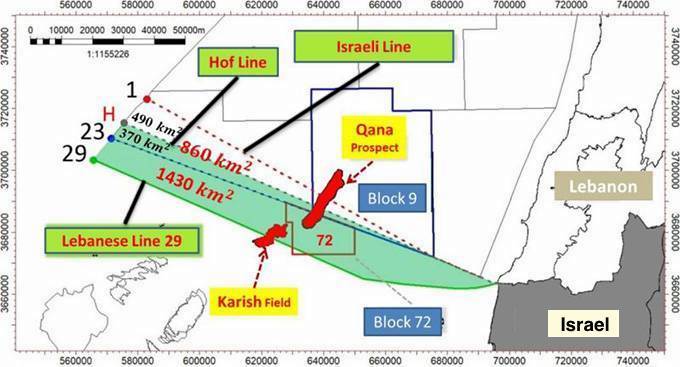
by middleeastmonitor.com — The US mediator in a long-standing maritime border dispute between Israel and Lebanon said on Friday that the negotiations to resolve the conflict have made “very good progress”, Reuters reports. The two countries are locked in US-mediated negotiations to delineate a shared maritime border that would help determine which oil and gas resources belong to which country, and pave the way for more exploration. Amos Hochstein arrived in Lebanon early on Friday for a lightning round of talks with top officials including the President, Prime Minister, Speaker and Deputy Speaker of Parliament, as well as security officials. “I think we’re making very good progress,” Hochstein said after meeting President Michel Aoun, deputy speaker, Elias Bou Saab and General Security chief, Abbas Ibrahim. He added that he was hopeful an agreement would be reached soon.
Speaking at the Rafik Hariri International Airport at the end of his visit to the country, Hochstein said: “I really feel that we’re making progress these last few weeks and I hope to make additional progress and materialize this for an agreement that at the end of the day will give hope and economic activity in Lebanon (and) bring stability to the region, and I think this will be good to all involved.” “I’m very hopeful with what I heard today, with what we discussed today, but still more work needs to be done,” the U.S. mediator said. He added that the United States is “committed to work to resolve the issues that remain to be able to see if we can reach an agreement that will benefit the people of Lebanon.” “At the end of the day that’s the goal that we have in mediating this dispute,” Hochstein went on to say.
Hochstein was last in Beirut in late July for meetings with Lebanese officials, saying after that visit that he looked “forward to being able to come back to the region to make the final arrangement”. At the time, a senior Israeli official told Reuters that the government would present a new Israeli proposal that “includes a solution that would allow the Lebanese to develop the gas reserves in the disputed area, while preserving Israel’s commercial rights”. A Lebanese official said, at the time, that the proposal would allow Lebanon to explore the entire Qana Prospect, an area with the potential to hold hydrocarbons and which crosses beyond Line 23. Line 23 is the maritime line that Lebanon first set as its border during negotiations, before ramping up its demands to a line further south. Exploration rights south of Line 23 would represent a concession by Israel.
By Naharnet — In 2017, Lebanon approved licenses for an international consortium by France’s Total, Italy’s ENI and Russia’s Novatek to move forward with offshore oil and gas development for two of 10 blocks in the Mediterranean Sea, including one that is disputed in part with neighboring Israel. The official, who spoke on condition of anonymity in line with regulations, said that France’s Total said that as soon as a deal is reached it will start exploration in the border area. Last month, Novatek announced it is withdrawing from the consortium. Lebanese media reported that a Qatari company will take over from the Russian firm. The dispute which involves competing claims over offshore gas fields escalated in June after Israel moved a production vessel near the Karish offshore field, which is partly claimed by Lebanon. Energean, the London-listed company licensed by Israel to extract gas from Karish, said on Thursday that gas would begin flowing within weeks, despite the disagreement.
Lebanon and Israel, whose border is U.N.-patrolled, have no diplomatic relations. They had resumed maritime border negotiations in 2020 but the process was stalled by Beirut’s claim that the map used by the United Nations in the talks needed modifying. Lebanon initially demanded 860 square kilometers in the disputed maritime area but then asked for an additional 1,430 square kilometers, including part of the Karish field. Israel claims the field lies in its waters and is not part of the disputed area subject to ongoing negotiations. A Lebanese official in mid-June said Beirut had made a new offer to Hochstein, holding back on demands for territory where Israel planned to imminently extract gas.
Beirut was pushing for the country’s maritime border to exclude Karish and include the nearby Qana field, instead, the official told AFP at the time. In a statement on Thursday, Energean said the “Karish project is on track to start production within weeks.” Hezbollah, which launched drones towards the Karish gas field in July, had threatened attacks if Israel proceeds with gas extraction in the disputed area.



